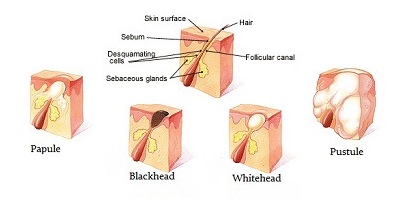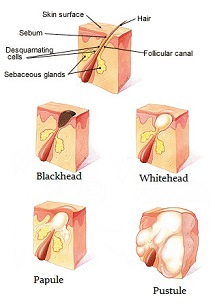
When it comes to the entire American population statistics indicate that 80% or more of us have had acne at some point in our lives. Based on those statistics it’s easy to see that acne is not racist or discriminatory what so ever, it afflicts all genders, sexes and ages making it a universal skin disorder. Therefore, having a basic understanding of acne, how to manage acne, and control acne, will go along way in helping reduce the embarrassing effects it seems to cause so many of us.
Acne A Basic Understanding
As a skin disease the good news is that acne is not contagious, although it can spread to many areas of the body. It’s also not true that acne only affects those going through puberty. In fact adult acne is extremely common. Acne is also a common condition that afflicts newborn infants as well.
Types and Classifications of Acne
Acne has different classifications, according to the severity of the infection. Acne infantilis is a facial acne condition that typically occurs in males around the age of three months old. Fortunately it is rarely associated with a systemic disease.
 A comedo, often characterized by red swelling or small lesions on your skin, is a clogged hair follicle (pore) and is where all severe acne cases originate. Whiteheads and blackheads are two forms of comedos. Blackheads are open comedos. The dark coloration is due to the accumulation of dark skin pigments called melanin, plus hardened sebum and other skin debris and particles. Whiteheads have the same basic structure, however, they differ only in coloration and are more deeply situated into the skin layers.
A comedo, often characterized by red swelling or small lesions on your skin, is a clogged hair follicle (pore) and is where all severe acne cases originate. Whiteheads and blackheads are two forms of comedos. Blackheads are open comedos. The dark coloration is due to the accumulation of dark skin pigments called melanin, plus hardened sebum and other skin debris and particles. Whiteheads have the same basic structure, however, they differ only in coloration and are more deeply situated into the skin layers.
Often causing sandpaper-like skin around the tissue of your mouth and on the surface of your forehead, chin and cheeks, papules are solid elevations of the skin with no visible fluid. These can be brown, purple, pink or red in color, and can cluster into a papular rash. Papules may open when scratched and become infected and crusty. Small elevations of the skin containing cloudy or purulent material are called pustules.
Similar to pustules are nodules, however nodules are firmer and larger in size, often growing deep in the skin. Highly inflamed nodules can result in a more serious case of acne called cystic acne. In such instances the assistance of a physician or skin dermatologist is often required. Surgery is sometimes needed in the most extreme cases.
What Causes Acne?
It is quite difficult to exactly determine the cause of an acne infection, as causes often differ from one individual to the next. Studies indicate that the skin disorder may be brought about by many factors including stress, poor diet, hormone changes, as well as, genetic influences.
Medically speaking, acne starts when the formation of hardened sebum, or the oily substance secreted by the sebaceous glands, mixes with dead skin cells and bacteria, and clogs a pore. The immune system is triggered to release white blood cells to obstruct the attack of the bacteria. As this happens, dead white blood cells and bacteria continue to accumulate in the hair follicle, further mixing with skin debris and dead skin particles, causing and inflamed lesion to form.
When it Comes to Acne, You’re Not Alone
Most mild case of acne can be treated with over the counter acne medications, generally topical drugs that you apply on your skin to treat your acne. These medications come in the form of soaps, lotions, gels and creams. Whereas mild acne is treated externally, systematic acne treatments are usually in the form of oral medications. The most common of which are the antibiotics.
Understanding that you are not the only one inflicted with acne should bring some comfort and help lesson your embarrassment. Given that acne will continue to breakout in places it’s not wanted, there will always be new research and new products coming to market. Having a basic understanding of acne is where it all begins.








Oh my goodness! Amazing article dude! Thanks, However I am hving issues with your RSS. I don’t know the reason why I cannot join it. Is there anyone else getting the same RSS issues? Anyone that knows the answer can you kindly respond?
Thanks!!
Nope, haven’t heard of any issues with the feed and it came up fine for me. Not sure what the problem on your end could be.